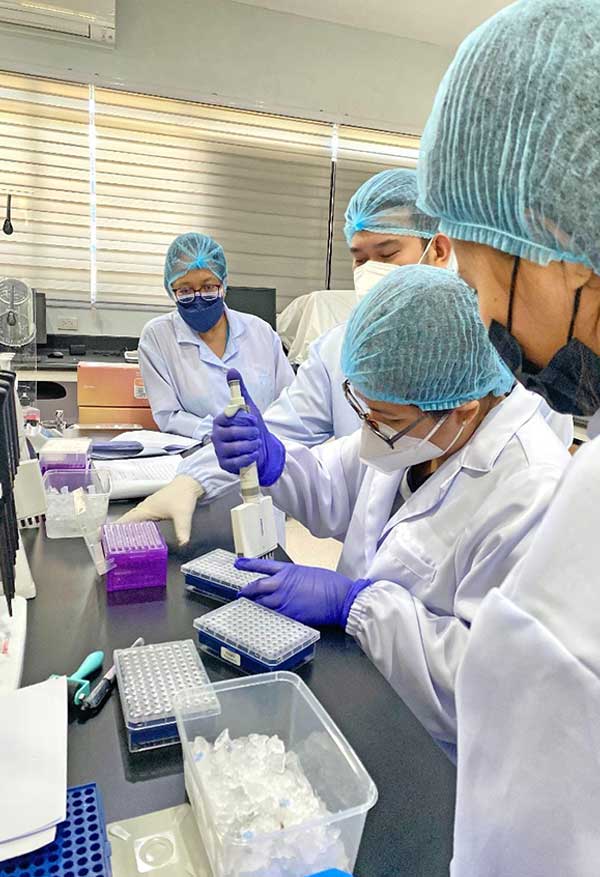Iloilo City – The Philippine Genome Center (PGC) Visayas launched its genomic biosurveillance services for the Severe Acute Respiratory Syndrome-Corona Virus 2 (SARS-CoV-2), which will further help prepare against future variants of the coronavirus disease 2019 (COVID-19) as well as possible future pandemics.
With the theme “Drawing on Collective Strengths for Pandemic Preparedness”, the expansions of PGC Visayas and Mindanao involved sequencing runs of the new Illumina NextSeq1000 platforms in their facilities.
These facilities are located at the University of the Philippines campuses in Visayas (Miagao, Iloilo) and Mindanao (Davao City).
Through the new sequencer platforms, extracted ribonucleic acid (RNA) samples of COVID-19 positive specimens from partner laboratories are received by PGC Visayas and Mindanao to undergo sample enrichment and whole genome sequencing.
Ceremonial sequencing was recorded via video at the PGC Visayas and Mindanao facilities by UP Visayas Chancellor Clement Camposano, and former and current UP Mindanao Chancellors Larry Digal and Lyre Murao, respectively.
Prior to this, samples from all parts of the country must be sent to the PGC’s main facility at the University of the Philippines-Diliman in Quezon City.
During the launch program on Friday, PGC Visayas and Mindanao directors Victor Marco Emmanuel Ferriols and Joel Hassan Tolentino reaffirmed the centers’ commitment to ensure accurate scientific information to help the country in its bout versus COVID-19.
“The PGC Visayas remains committed to our mandate of serving the nation through the judicious use of genomics and other omics technologies. At this time, we need to help each other to stop [the spread of] COVID-19. Together with [national government agencies] and cooperation with the community, we can surely do this,” said Ferriols.
“Through PGC Mindanao, there will be more samples that will be analyzed and results will be fast-tracked. Thank you to our partners and supporters. We are all together in our battle against COVID-19,”
PGC Executive Director Cynthia Saloma said that the expansions in Visayas and Mindanao will address logistical challenges of transporting SARS-CoV-2 positive samples sent to the center’s facility in Quezon City.
“The expansion of genomics surveillance services in our regional facilities in the Visayas and Mindanao makes possible the increase in the number of samples we can sequence around the archipelago,” said Saloma.
University of the Philippines President Danilo Concepcion noted the PGC’s scientists working side by side with local and national governments “to provide accurate science information, to generate appropriate plans and policies to safeguard the people’s wellbeing in order to save lives.”
The university president said that the launch strengthens the collaboration between the academe and the government in the national genomic biosurveillance effort.
“For the UP PGC, this means, among other things, conducting genomic biosurveillance to detect and track the transmission of COVID-19 variants in the country (sic). The UP PGC’s genomic biosurveillance also allows for the rapid development of diagnostic tests and vaccines, and pharmacological treatments for [COVID],” said Concepcion.
Department of Health Secretary Francisco Duque in his message, which was read by Epidemiology Bureau chief Althea De Guzman, thanked the PGC in its efforts helping the national government through its biosurveillance technology.
“This groundbreaking milestone continuously proves [the PGC’s] prowess in commitment to innovation and growth for the betterment of the country in terms of biosurveillance,” said the health secretary’s message.
“With the introduction of genomic biosurveillance in the Visayas and Mindanao, we are one step closer to being better in determining the causes of outbreaks, tracking how a virus is transmitted, and complementing the routine disease surveillance. This is not only beneficiary to the COVID-19 response, but goes beyond to the health response of the country for the years to come,” he added.
Department of Science and Technology (DOST) Secretary Fortunato Dela Peña, in his recorded video message, said that the expansion of the capacities of PGC Visayas and Mindanao symbolized the center’s evolution “that could further serve the nation”.
“With the science at the forefront of our interventions, and genomics among the arsenal of research methods, I am confident that our shared goal will be achieved, all for the improvement of every Filipino’s life through health research,” said Dela Peña.
“Today’s event is meaningful not just for the PGC family, but also for the DOST and the Philippine Council for Health Research and Development, as it is a reflection of our efforts in putting premium investment in omics research, recognizing in increasing importance in the field of medicine and healthcare,” he added.
The PGC, which was established in 2009 at the University of the Philippines-Diliman, became more known to the public as being the lead facility in detecting COVID-19 variants, including the more notable Delta and Omicron variants.
PGC Visayas and Mindanao were established in 2020 and 2019 with funding support from the DOST-Philippine Council for Health Research and Development. (Joseph Marzan via The Daily Guardian (TDG), photo courtesy of TDG)

